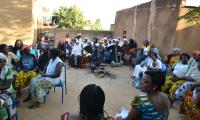Slow progress of equality in marriage dissolution in francophone West Africa

A new research publication finds that family law is slowly evolving towards greater equality between men and women when marriage ends in Mali, Niger and Senegal. In practice however, divorces happens in an informal way that involves various traditional and religious norms, which do not have gender equality as their main between characteristics.
In West Africa, marriage is regarded as a social necessity and divorce as a disaster for the spouses, their family and the community. Therefore, divorce is a difficult, shameful and taboo subject.
When the marriage ends, often through repudiation at the exclusive initiative of the husband, the social difficulties encountered by women are compounded by the common problem of acute economic hardship, especially in Niger and Mali, which puts women at risk of becoming extremely vulnerable in the event of divorce.
Taking into account these formal and informal ways of ending marriage, the study makes a number of recommendations in order to spur greater equality. Firstly, the legislative and judicial framework for family cases should be refined. Secondly, customary law should be considered in family matters so that both local needs and human rights are respected. And finally, women should receive increased practical support when going through divorce.
It is often not the case that the rights of women are respected when the marriage ends, senior researcher of the Danish Institute for Human Rights, Stéphanie Lagoutte, explains.
- Divorce granted in court offers a real guarantee of equality between men and women, as well as legal security. However, this legal form of divorce is only rarely an option in practice. Legislators and judges cannot afford to ignore this reality, and must both work to ensure that the rights of all those involved in divorces are protected, according to Ms. Lagoutte, who supervised the research.
A landmark in its own right
The political climate especially in Mali and Niger does not encourage peaceful and balanced debate on a subject which involves sensitive issues such as the place of family in society, marriage and divorce, the implementation of human rights standards and the role of Islam and Islamic organisations in society.
- In this particularly sensitive context, any attempt to reform family law becomes an enormous political undertaking and threatens destabilisation for those in power. It is therefore necessary to support the production of solid and objective knowledge in order to inform the social and political debate on family and human rights, Stéphanie Lagoutte says.
Therefore, simply conducting the study is a success. Over the past few years, a team of senior researchers, young academics and legal practitioners from francophone West Africa has been exploring the diverse realities of divorce in Mali, Niger and Senegal. Through gathering and analysing judgements from local tribunals and interviews with a large range of persons involved in divorce, the researchers dived into the situation at local level.
- One of the many aims of this research project has been the capacity building of a team of scholars which could design and carry out a project on divorce, women and human rights, says senior researcher Stéphanie Lagoutte.
The research results were presented in each country at a seminar gathering relevant stakeholders. The debates at national level put renewed focus on the need for family legislation more protective of women’s rights, especially in Mali and Niger.
- It is important that our researchers contribute to the national social debate. These research reports should be read and used as tools for public action, said professor Tidjani Alou, dean of the law faculty in Niamey, Niger, in his opening speech of the seminar on the research project.
